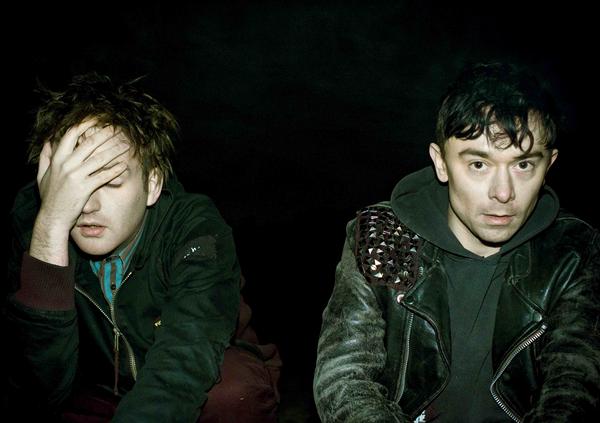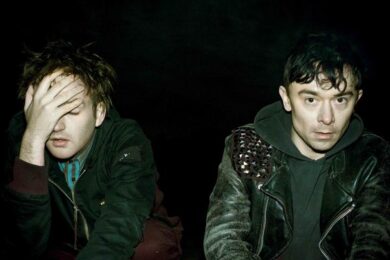Ignore the faux same-sex posturing and celebrity friends, and deafen your ears to the irritating buzz emanating from the hordes of Shoreditch hipsters who have been crawling over them and trying to suck every last drop of cool from their bodies: The Big Pink have a healthy filling of substance to complement their effortless style. Formed by multi-instrumentalists Robbie Furze and Milo Cordell after a chance meeting at a late night rave in Hackney Wick, the electro-rock duo have combined the dreamy essence of Spiritualized and Spacemen 3 with the serrated edge of My Bloody Valentine to create their debut album A Brief History Of Love, released in September. The result is a luscious brew of feedback drenched melodies and piercing synthesiser riffs topped off with anthemic choruses that’s as satisfyingly ethereal as the wispy smoke from a post-coital cigarette.
The Quietus gave keyboard and synthesiser player Milo a call to discuss homoeroticism, falling in love and an irrational fear of fruit…
Hello, Milo. Could you tell us about the history of The Big Pink and how it came about?
Milo Cordell: Robbie and I had been friends for quite a few years. We bonded, I guess, over music. We met at a rave through mutual friends, because we used to be part of a scene who used to go to the same parties and stuff, and we walked home together in the early morning from Hakcney Wick, which was fucking miles away. We started a record label together called Hate Records, and Robbie formed a band called Panic DHH after playing guitar for Alec Empire [founding member of Atari Teenage Riot]. And then eventually, we started to make music together as The Big Pink. We just wanted to make the most aggressive noise we could.
The Big Pink ‘Velvet’
Why do you think that this particular combination works?
MC: Well, this is the first musical project I’ve ever been in even though I’m 28, so there’s a lot of honesty and naiveté. A lot of people who are making music in their late 20’s have been making music for a while, but I bring a naiveté to the creative process, like a 16-year-old who makes music but hasn’t really got an idea of what they should and shouldn’t try. And Robbie, he’s got a lot of experience, so that contrast works well. He’s had lengthy discussions with Alec Empire about music, and noise – he’s got a PhD in noise and his tutor was one of the grand masters.
Did you every worry that people might not take you seriously because of the bands Robbie used to be in? Not because they’re embarrassing, but because there’s such a big difference between Panic DHH and The Big Pink; it might lead people to think there’s something untrustworthy or inauthentic about the whole thing…
MC: I don’t think so. Obviously this was my first project and for Robbie, it’s still the exact same process of making music. There may not be as much distortion, but there are still similar song structures and stuff. I’m not worried about any sort of criticism at all. If I started worrying about those kind of things I’d never leave the house. I’d never do anything and I’d be on some sort of medication.
Robbie was so depressed in those bands, too. Things have changed now. Being in this band is a whole new lease of life. I think when he closed the door on Panic and those things he opened a whole new one, and it’s a lot more positive.
Panic DHH ‘Simplex’
I see. Let’s talk about the music. The Big Pink get compared a lot to bands like Spiritualized and Spacemen 3, which I think is definitely accurate, but there’s also a darker, sharper and louder aspect to it as well…
MC: Well, it’s funny, because we never listened to any of those bands. We weren’t into UK shoegaze at all. Over the last two years I’ve listened to it a lot, but we were always more into industrial stuff like Nine Inch Nails, or the Smashing Pumpkins. And that’s in our music – Robbie can really shred. Not many UK indie musicians shred that much, you know?
Do you think with you, The Horrors and The Engineers, there could be a bit of a shoegaze revival? For a while it was a neglected, even derided, genre…
MC: Yeah, it was a dirty word, shoegaze, wasn’t it? I think it’s great that that kind of music is getting popular again, but I wouldn’t want to be part of any conscious revival. I think some of these bands – not The Horrors – but there are some bands who are just trying to be shoegaze and that’s it. There’s nothing more to them. What’s great about The Horrors is that they aren’t scared of the big chorus, which is brilliant.
I think you could say that about The Big Pink, too. Your hooks and choruses are huge and pop like. Was that a conscious decision?
MC: I don’t know. It was just the way we did it. Was there a conscious decision to be a pop band? Probably yes in the least cynical way imaginable. I mean, every band wants to be popular, or at least 99% of them want to be. I think we wanted to be popular, but we didn’t want to be pop music, if you see what I mean.
Yes. So, we should probably ask about the whole homoerotic aspect of the band. Where did that come from?
MC: It started when I was reading a book by a writer called Dennis Cooper, who’s part of this really cult literary community, and it was really…not porn, but very heavy and graphic, very druggy and lots of references to homosexuality. I was reading it at a time when the band was just starting to take off and we were doing a photograph for Vice magazine, and they wanted to take a really boring photograph of us just standing against a wall. I hate bands who do that – it should never just be about the music. It’s about everything. So when the photographer, Gavin Watson, wanted to recreate this photograph he’d taken for Skins of two people kissing against a wall, we were just like “Fuck yeah!”. It was just supposed to be funny, and different. And I do think we had a little man crush on each other back then, because we were spending so much time together and having such a good time creating music. It was all so new.
Was it a calculated decision? There’s a rich history of pop stars like Bowie and Morrissey toying with their sexuality…
MC: I don’t think we did it in a kind of Brett Anderson way. We weren’t trying to rile the media. It was just a joke. We wanted to do something different and something funny. I couldn’t care if some check-shirted lumberjack from Sheffield calls us “fucking poofs” or something. I couldn’t care at all. [Ah, the legendary lumberjacks of Sheffield, Ed]
If you were gay, would you be make a good couple?
MC [Laughs]: If Robbie was a bit taller, then maybe. I know I’m his dream man, though. He already told me.
Your debut album, A Brief History Of Love, comes out next month. Every song on the album is about love. How did that happen?
MC: It was a turning point for me and Robbie. We’d both just come out of heavy relationships. There was a lot of self-reflection and looking back, a lot of heartbreak and drugs and drink, but at the same time there was a determination to go out and find new love, a sort of defiance. It’s completely divided.
Everything was written hungover and over the period of six months when we’d go out together every night. I think that’s why it came so naturally. We’d go out together, we’d meet girls who were with friends. We shared the same experiences, so the emotion flowed beyond the lyrics and into the noise; it filtered into the synthesisers through the pedals.
It seems to be about every aspect of love, as well. Not just slushy ballads – all the chaos and confusion which comes with the territory.
MC: Yeah, absolutely. It’s the plus and the minus, the good and the bad, the hot and the cold. It’s got triumph and joy and then the complete opposite.
Is it fair to call it a concept album?
MC: I’ve been thinking about that since last night, because I’ve been doing quite a few interviews recently and I knew someone would ask that at some point.
And?
MC: I didn’t come up with an answer. It wasn’t written as a concept album… I don’t think it’s a concept record. I mean, haven’t there been about 25 concept albums in the last five years which are all supposed to tell the story of a night out? It isn’t like that. But then, I love Screamadelica as a concept record about an acid trip, so maybe this is a relationship concept record, although I think ‘concept’ is too premeditated.
What’s your favourite love song?
MC: Oh, that’s really hard… Ok. I listen to Magic FM a lot when I’m coming home. Now, I’m sure if I really thought about it I could come up with something much cooler, but I’m going to say Sinead O’Connor ‘Nothing Compares 2 U’. I don’t even remember when it was released, but I can remember my mum listening to it in the kitchen and crying. Her voice is so brilliant, and the lyrics are great too.
Can you remember the first time you fell in love?
MC: Well, I used to think I was in love every week, every time I met somebody new. But as I’ve grown older, I think I’ve only been in love once.
Are any of the songs on the record about her?
MC: Yeah, definitely. They’re all on the record. [Laughs] But certain songs are definitely about certain people. I know the girl who ‘Dominoes’ is written about wasn’t very happy, because she told Robbie’s girl, who told him, who told me. But the girl who I wrote ’Velvet’ about was very pleased, so that’s something I guess.
How about homosexuality?
MC: Well, there’s one called Frisk, which comes from the title of a Dennis Cooper book, but that’s about it.
Maybe you could describe the whole album as a big love letter between you and Robbie…
MC: [Laughs] Yeah, you could definitely say that.
Let’s ask the Heat question. There were some tabloid mumblings a while back about Robbie and Lily Allen. Are any of the songs about her?
MC: No. Nothing ever happened there. She was just in a bad way and Robbie let her stay at her his house. It was just the media blowing it out of proportion. But Lily is fucking brilliant, she’s such a mouthy bitch. She’s always been a pop star, even before she started singing songs.
Ok. Well, let’s end on a more light-hearted note. Robbie admitted in an interview that he’s scared of sharks. What’s your main phobia?
MC: I hate bananas. Fruit, I don’t like any kind of fruit. I find it so alien. There’s something about when an apple core turns brown or when a banana skin turns black. I just hate things perishing in front of me. I don’t mind the taste, but there are some which are ok and some which really offend me. It’s the ones you can see visibly wasting away. Maybe it’s just a metaphor that I’m extremely scared of death.



